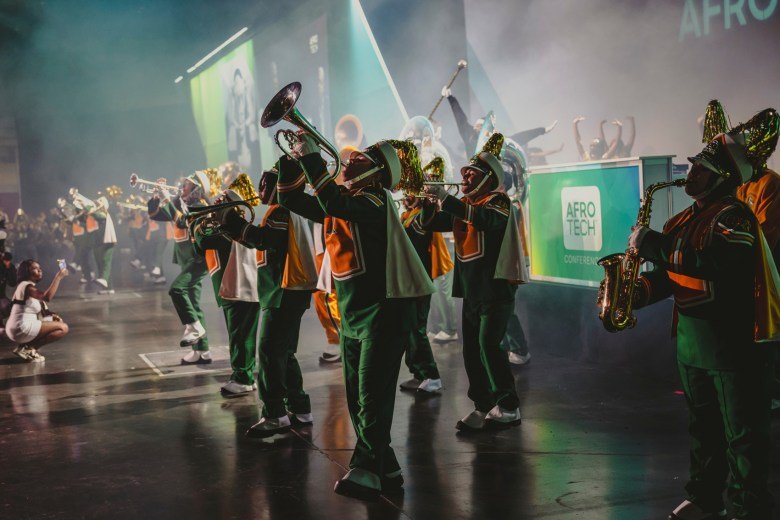AfroTech, one of the largest global tech conferences for Black professionals, entrepreneurs, and innovators, has come to Houston for the first time.
Organizers expect roughly 37,000 people to attend the conference, which runs until Saturday at the George R. Brown Convention Center.
Previously, the conference has been held in major cities known for their sizable tech industries, like Austin and San Francisco. Conference representatives said this year was the right time to bring AfroTech to Houston, citing the city’s expanding role in global industries like health, energy, and aerospace.
“The city’s strategic importance in these industries, combined with its diverse community, makes it the ideal place for AfroTech to further its mission of supporting Black professionals in tech,” an AfroTech spokesperson said in a prepared statement.
Although Houston is known for leading in these industries, organizers said the city is also emerging as a hub for tech innovation.
“With a focus on sectors like energy tech, health tech, and aerospace tech, Houston is attracting startups, investment, and talent,” the spokesperson said. “The city’s expanding infrastructure and dynamic entrepreneurial ecosystem are contributing to its increasing recognition as a key player in the tech industry.”
Attendees will learn from industry leaders and peers at panels and engage in a variety of interactive workshops on data engineering, AI, and cybersecurity. Attendees will also hear from more than 50 speakers including rapper, actor, entrepreneur and philanthropist, Tip “T.I.” Harris; Houston-native actor, founder, and president of BLD PWR, Kendrick Sampson, actress, human rights advocate, and founder and CEO of TransTech Social Enterprises, Angelica Ross, among several others. The conference concludes Saturday with a block party with performances from a slew of Houston artists: Bun B, Slim Thug, Mike Jones, and R&B group, Jagged Edge.

Los Angeles-based digital media and tech company Blavity Inc. is the company behind AfroTech, launching the conference in 2016 in San Francisco. Since then, the conference has aimed to bridge culture and technology, drive innovation and promote diverse perspectives. It also aims to inspire future Black leaders within the tech industry where Black professionals are significantly underrepresented. Black workers account for just 7.4 percent of the high-tech workforce and 5.7 percent of high-tech managers, despite making up nearly 12 percent of the total U.S. workforce, according to U.S. Equal Employment Opportunity Commission.
“Nobody is coming to save us, but standing in this room and looking at each and every one of your faces I know with absolute certainty that we don’t need saving,” said Morgan DeBaun, Blavity co-founder and CEO, Wednesday before a packed room at the conference’s opening ceremony.
“We are the architects, the innovators, the disruptors, the builders of tomorrow, and the future is not something that’s happening to us. It’s something that we certainly can create.”
While the core focus of AfroTech is technology, it also draws individuals from health care, energy, aerospace, consumer goods and entertainment.
“What excites me most about it is the intersectionality of tech and all these different industries, and bringing that all under one roof, just filled with Black excellence,” said Sierra-Leone Jones, a first-time attendee from Seattle.
She came to experience AfroTech in hopes of one day advocating for Seattle to get its turn at hosting.
“(Black people) are out there, but people don’t realize it,” Jones said.
AfroTech coming to Houston, however, didn’t come as a surprise to many like Jones because it’s known as a prominent city for Black professionals.
“There’s a huge potential for financial equity when you go into tech. It kind of levels the playing field for Black people,” she said. “The awareness of tech positions is really what it is and Houston is a big city for Black people.”


‘Houston can handle it’
Other longtime tech professionals, some of whom are attending the conference for the first time, echoed her sentiments but noted Houston’s emerging tech landscape.
“The thing that I’m seeing with Houston is that there’s a lot of collaboration,” said third-year attendee, Ty Smith. “A lot of people in the tech community know each other, they’re all working together and they’re all helping out to build up the tech ecosystem.”
Smith traveled from Las Vegas with his wife Ayanna to recruit people into tech sales. While Ayanna acknowledged Houston’s emerging tech scene and prominent Black community make AfroTech a good fit, she also thinks it goes beyond that.
“It’s a really good place to have a conference where there’s a great convention center, booming downtown, it can absorb 20,000 people easily with enough hotels, eateries, all the stuff that conventions need,” she said. “Whereas some cities that might be a strain on their infrastructure. Houston can handle it.”
First-time attendee Kyle Corridon has worked in the tech industry for roughly 12 years and recently moved from New York to Dallas. He said before moving here, the only Texas cities he knew of with a robust tech scene were Austin and Dallas.
“A lot of it, I think, is because of what the cities are doing to bring in those companies to their neighborhoods,” he said.
An example, he said, is the city of Dallas easily approving permits for his employer, Samsung Electronics, to build a warehouse, corporate headquarters and space for a semiconductor factory. When that happened roughly a year ago, he said Samsung quickly moved him there from New York.
“Texas because it (has) the benefit of not having any state income tax in addition to the other incentives that the other cities are working directly with the companies to help them establish their base,” he said.
But between Dallas and Houston, he thinks Houston is the better pick because there’s a greater need for tech and a greater reach than Dallas, where he tends to see more product experts being recruited there.


“I don’t believe that you’re going to see as large of a turnout of tech enthusiasts because a lot of the people here at the conference aren’t just part of tech companies. They’re also part of HBCUs still trying to break into tech as well,” Corridon said. “When you’re looking at (the) Dallas area, a lot of people who are in tech have been firmly rooted in tech.”
Last year in Austin, the event drew more than 35,000 participants and generated $42.8 million in total business sales, with $8 million directly benefiting the local community, according to conference representatives. But this year, organizers expect an even greater impact because of the larger crowd.
“We outgrew Austin pretty quick,” said DeBaun, at the opening ceremony. “Houston is much larger.”
Organizers believe the exposure from AfroTech 2024 will help Houston’s tech companies attract new investment, opportunities and talent, as well as further accelerate its growth in the global tech ecosystem.
“Historically, our host cities see incredible engagement from the local community, and we’re already seeing that energy in Houston,” the spokesperson said. “AfroTech remains a magnet for professionals and innovators from around the world, and this year’s conference will be no exception — Houston is ready to make history.”











